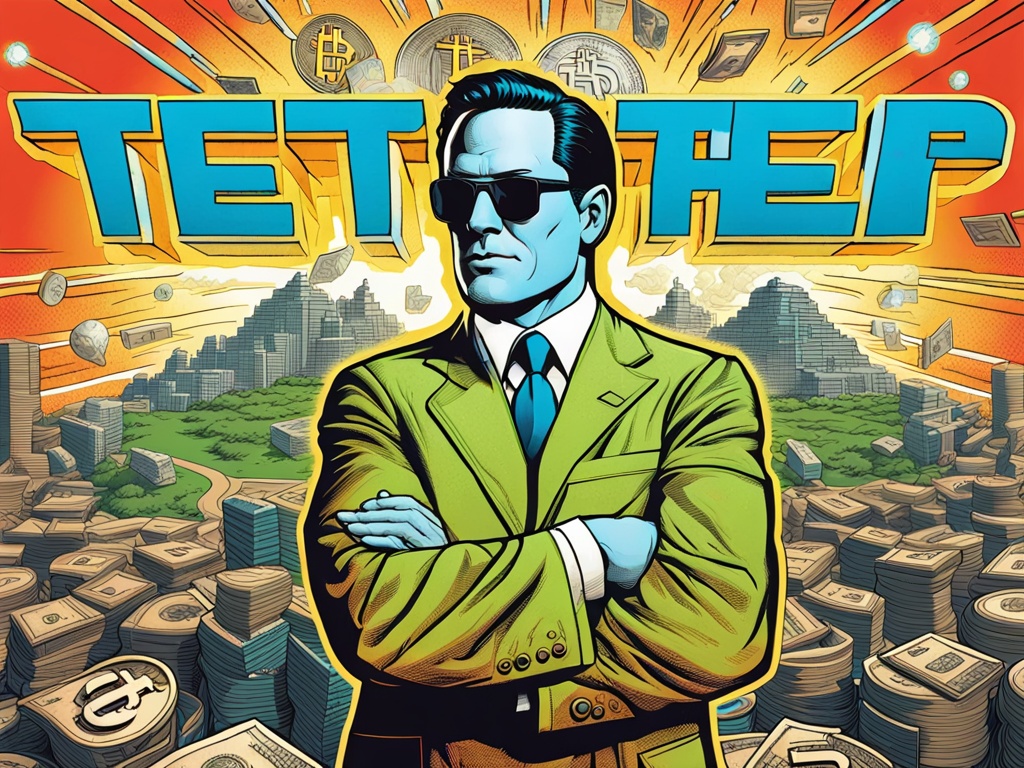🚀 Overview: Financial Services and Cryptocurrency Stake
The financial services powerhouse, Cantor Fitzgerald, has secured a 5% equity interest in Tether, the largest issuer of stablecoins globally, resulting in a deal valued at approximately $600 million. This stake positions Cantor Fitzgerald strategically within the competitive landscape of cryptocurrency as it seeks to capitalize on Tether’s vital role in the market.
🏛️ Political Influence of Cantor Fitzgerald
This year, Cantor Fitzgerald’s acquisition allows the firm to possibly leverage the political connections of its CEO, Howard Lutnick. Recently appointed as Secretary of Commerce under U.S. President-Elect Donald Trump, Lutnick’s new role could empower him to navigate the complex regulatory environment surrounding cryptocurrency.
According to reports from the Wall Street Journal, Cantor Fitzgerald’s engagement with Tether is likely to enhance the issuer’s reputation as it faces heightened scrutiny from regulatory bodies. This political connection may serve as a significant advantage for Tether in managing the various challenges it currently confronts.
🔍 Tether Under Investigation
Tether has been subjected to ongoing investigations by the U.S. Attorney’s Office for the Southern District of New York. The inquiries primarily focus on the alleged use of Tether’s stablecoin, USDT, in potentially illicit activities, including financing terrorism.
Under these circumstances, Lutnick’s influence could emerge as a crucial factor in addressing and alleviating regulatory challenges. Tether’s primary shareholder, Giancarlo Devasini, has reportedly expressed optimism in Lutnick’s ability to mitigate these threats, indicating a strategic partnership that could be beneficial for both parties.
Lutnick’s involvement in the transition team for Trump may offer him the opportunity to recruit individuals for government roles that could significantly affect Tether’s regulatory landscape. His potential step down as CEO of Cantor Fitzgerald is expected upon confirmation of his secretary position, which may lead to further developments in this dynamic relationship.
🏦 Stability Amidst Scrutiny
Cantor Fitzgerald has played an essential role as a banking partner for Tether, particularly during a time when many financial institutions have chosen to distance themselves from the stablecoin sector. The firm manages a substantial portion of Tether’s $134 billion in reserves, primarily invested in U.S. Treasury securities. This arrangement underscores the importance of Cantor Fitzgerald in supporting the stability of the USDT’s dollar parity.
Lutnick has publicly affirmed Tether’s financial soundness, highlighting the critical role that dollar-backed stablecoins can serve in economies grappling with inflationary pressures, such as those experienced in Argentina, Turkey, and Venezuela. This stance reflects a broader understanding of the mechanisms by which cryptocurrencies can provide financial relief in challenging economic climates.
🔗 Expanding into Bitcoin Lending
Highlighting its increasing footprint in the crypto sector, Cantor Fitzgerald recently unveiled plans for a Bitcoin lending initiative worth $2 billion. Announced at the Bitcoin 2024 conference, this program aims to provide leverage to Bitcoin holders, illustrating the firm’s commitment to playing a more significant role in the digital asset ecosystem.
📊 Regulatory Developments in Stablecoins
The stablecoin market continues to grow, now valued at over $140 billion, yet remains largely unregulated within the United States. Recent developments include Senators Cynthia Lummis and Kirsten Gillibrand collaborating to propose legislation aimed at regulating stablecoins. Their bill outlines specific operational and reserve requirements for payment stablecoin issuers, thus establishing a framework for greater oversight.
The proposed legislation designates payment stablecoins as digital assets pegged to the U.S. dollar, intended for use in various transactions. Issuers would be required to convert these digital assets to dollars and would not be deemed securities under this framework.
To qualify as issuers, entities would need to be either non-depository trust companies registered with the Federal Reserve or depository institutions authorized to issue stablecoins nationally. Both state and federal regulatory bodies are expected to oversee these operations.
🌍 Global Regulatory Landscape
As the U.S. explores regulatory measures, other countries are also taking steps toward formalizing their crypto frameworks. The United Kingdom anticipates implementing new regulations for stablecoins within the coming months, according to Dante Disparte, the global head of policy at Circle. Meanwhile, Singapore has already established laws for the stablecoin sector, illustrating a global trend toward structured regulation.
🔥 Hot Take: Navigating a Changing Landscape
The intersection of traditional finance with the evolving cryptocurrency space is increasingly nuanced, particularly as regulatory scrutiny intensifies. The strategic moves by firms like Cantor Fitzgerald to invest in stablecoin issuers like Tether reveal a proactive approach to addressing potential challenges in this sector. With political dynamics and regulatory frameworks shifting, close attention to these developments will be crucial for understanding the future of cryptocurrencies and their adoption globally.
Sources: [Wall Street Journal](https://www.wsj.com)





 By
By

 By
By
 By
By
 By
By
 By
By